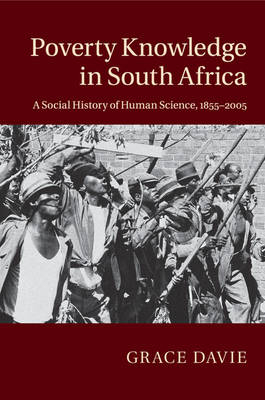
Poverty Knowledge in South Africa
Cambridge University Press (Verlag)
978-1-107-55173-2 (ISBN)
Poverty is South Africa's greatest challenge. But what is 'poverty'? How can it be measured? And how can it be reduced if not eliminated? In South Africa, human science knowledge about the cost of living grew out of colonialism, industrialization, apartheid and civil resistance campaigns, which makes this knowledge far from neutral or apolitical. South Africans have used the Poverty Datum Line (PDL), Gini coefficients and other poverty thresholds to petition the state, to chip away at the pillars of white supremacy, and, more recently, to criticize the postapartheid government's failures to deliver on some of its promises. Rather than promoting one particular policy solution, this book argues that poverty knowledge teaches us about the dynamics of historical change, the power of racism in white settler societies, and the role of grassroots protest movements in shaping state policies and scientific categories. Readers will gain new perspectives on today's debates about social welfare, redistribution and human rights, and will ultimately find reasons to rethink conventional approaches to advocacy.
Grace Davie is Associate Professor of History at Queens College, City University of New York. Her articles have appeared in the Journal of Southern African Studies, Waging Nonviolence, YES! magazine, and OD Practitioner.
Part I. Lay Knowledge Meets Human Science, 1855–1940: The Co-production of the 'Poor White Problem': 1. Before poverty measurement: conjuring worlds without want; 2. The human sciences in interwar South Africa: William Macmillan, I. D. MacCrone, and the Carnegie Commission; Part II. The Limits of Invention, 1940–70: Social Reform and Quantitative Objectivity: 3. The minimum standards moment: Edward Batson and the Poverty Datum Line (PDL); 4. Rethinking governmentality: urban planning, rural betterment, and the apartheid state; Part III. The People's Facts: Epistemic Mobility and the Negotiated Settlement, 1970–2005: 5. Agitation through quantification: white student activists in the era of black consciousness; 6. From people's power to corporate power: poverty research and the transition to democracy; 7. Baselines and battle lines: social surveying after apartheid; Conclusion; Epilogue.
| Zusatzinfo | 2 Halftones, unspecified; 1 Line drawings, unspecified |
|---|---|
| Verlagsort | Cambridge |
| Sprache | englisch |
| Maße | 153 x 230 mm |
| Gewicht | 520 g |
| Themenwelt | Geschichte ► Allgemeine Geschichte ► Neuzeit (bis 1918) |
| Geisteswissenschaften ► Geschichte ► Geschichtstheorie / Historik | |
| Geisteswissenschaften ► Geschichte ► Regional- / Ländergeschichte | |
| Geschichte ► Teilgebiete der Geschichte ► Kulturgeschichte | |
| Sozialwissenschaften ► Soziologie | |
| ISBN-10 | 1-107-55173-0 / 1107551730 |
| ISBN-13 | 978-1-107-55173-2 / 9781107551732 |
| Zustand | Neuware |
| Haben Sie eine Frage zum Produkt? |
aus dem Bereich


